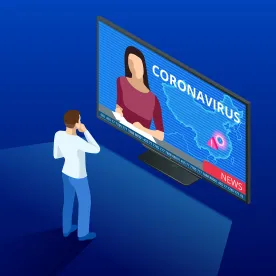In a September 2005 release soon after Hurricane Katrina, the Internal Revenue Service (IRS) reported that for the first time ever, the IRS and the departments of Treasury and Labor would provide broad-based relief to retirement plan participants affected by a major disaster. Broad-based relief has been provided since to residents of specific disaster areas, but the 2020 coronavirus pandemic, known as COVID-19, is a disaster that has affected all communities in the United States. On March 27, 2020, Congress passed the Coronavirus Aid, Relief, and Economic Security (CARES) Act, which was quickly signed by President Trump.
Some employers and plan recordkeepers have been overwhelmed with calls from participants requesting plan loans or hardship distributions. Some plans do not allow loans or hardship distributions. Other plans allow hardship distributions, but existing rules may pose a problem for many participants.
For employees affected by COVID-19, the CARES Act opens up new sources for emergency cash from their accounts in qualified retirement plans, 403(b) plans and governmental 457(b) plans. Employers must elect to add these features to their plans (they are not mandatory) and need to amend their plans by 2022. While your plan recordkeeper prepares to make coronavirus-related distributions available, we want to make it easier for you to inform your employees. We recommend taking prompt steps to avoid participant confusion. Notwithstanding, considering the chief purpose of the retirement plan is to provide a benefit at retirement, you may want to consider limiting how much can be withdrawn. The following is a sample notice for your plan participants.
* * * * * * *
Coronavirus-Related Distributions
Who Is Eligible? You are eligible for a coronavirus-related distribution if any of the following applies: (1) you have been diagnosed with the virus SARS-CoV-2 or with coronavirus disease (“COVID-19”) by a test approved by the Centers for Disease Control and Prevention; (2) your spouse or dependent is diagnosed with the virus or disease by such test; or (3) you experience adverse financial consequences as a result of being quarantined, furloughed, or laid off, or having work hours reduced due to such virus or disease, or the closing or reduced hours of a business owned or operated by the individual due to such virus or disease, or other factors as determined by the secretary of the Treasury (or the secretary’s delegate).
In-Service Distributions. If you are eligible, you can relieve your financial distress by withdrawing from your vested accounts in the [Drafting Note: insert name of plan, such as ABC 401(k) Plan]. Any one or more coronavirus-related distributions totaling no more than $100,000 that are made by an eligible participant until December 31, 2020, can qualify as “coronavirus-related distributions.” The following special rules apply to coronavirus-related distributions:
-
The 10% early withdrawal penalty tax usually applicable to payments made before age 59½ does not apply.
-
The payment will be subject to income tax, but you can elect to pay tax on the amount equally over a three-year period. For example, if you withdraw $30,000 in 2020, you can include $10,000 as income for each of 2020, 2021, and 2022 — rather than owing taxes on the entire $30,000 for 2020. This election is made when you file your personal tax return.
-
The distribution will be exempt from the 20% mandatory tax withholding that generally applies. Your recordkeeper may withhold 10% from the distribution for income tax purposes, unless you elect otherwise.
-
Your deferrals will not cease when you take a coronavirus-related distribution. If you want to temporarily stop future contributions, you may do so by contacting [Drafting Note: Plan Administrator to complete this sentence].
-
At any time during the three-year period beginning with the date of the distribution, you may repay to the retirement plan, if still employed (or to an IRA or other tax-qualified plan), any portion of the amount taken, and you will avoid having to pay tax on that portion. In the past, the IRS used Form 8915 for individuals who were adversely affected by a disaster and received a distribution that qualified for favorable tax treatment. You will need to report any recontribution made during a taxable year and to determine the amount of the coronavirus-related distribution includible in income for the taxable year.
Plan Loans. If you are eligible for a coronavirus-related distribution, the restrictions on taking a loan from your accounts in the retirement plan have been changed.
-
You may make a new loan during the period between March 27, 2020, and September 23, 2020. Your total borrowings can be as much as $100,000 or, if less, the balance of your vested account (the usual plan loan limit is $50,000 or 50% of the account balance). Other rules may continue to apply such as the maximum number of loans that you can have at one time. [Drafting Note: Plan Administrator to add other applicable limitations.]
-
Whether your plan loan is made before or after you become eligible for a coronavirus-related distribution, you can elect to suspend the repayment of your loan payments before December 31, 2020, for one year without putting your loan in default. Interest continues to run during the time your payments are not being made.
-
When you resume repayments, you will be given a new amortization schedule. If you wish, the deadline for the final payment can be extended by a time equal to the length of the suspension, but no longer than one year from the date of the original loan payment.
The Big Picture. Keep in mind that the purpose of your retirement plan is to provide for your retirement. Amounts kept in the plan, and the earnings they produce, are not taxed until eventually paid to you. In addition, it is always wise to consult with a financial or tax advisor before taking any distribution from your plan, particularly in periods of volatile stock market activity. Also, because of the tax benefits of keeping your plan accounts whole, you may wish to explore other types of financial assistance before you apply for any of the benefits described above.
* * * * * * *
Remember that legal principles may change and vary widely in their application to specific factual circumstances. You should consult with counsel about your individual plan. The sample notice may vary depending on the terms of your plan and specific factual circumstances.





 />i
/>i

